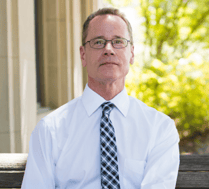If you have hundreds of rolls of toilet paper stacked in the basement, it may just seem like a sign of these unusual times. But Kogod School of Business professor Ron Hill believes it may be something worse: a portentous omen for the future.
Even after we climb out of our hermetically sealed bubbles, Hill thinks this seemingly aberrant behavior might continue.
“People might just store food and other products for the long term,” says Hill, an expert on consumer vulnerability. “The way that we make decisions about what we buy and what we do has shifted—and potentially shifted permanently.”
Circling the Wagons
 With a lack of access to basic necessities, Hill says people’s shopping calculus changes.
With a lack of access to basic necessities, Hill says people’s shopping calculus changes.
“It was, ‘I expect the material world in which I live to give me access to certain things on a regular basis.’ And now that these products are no longer available, people begin to have a scarcity mindset,” he explains.
If this sounds innocuous—simply causing spikes in Costco memberships—Hill worries that it can bring out selfishness in people. But, he notes, it’s not a selfishness that’s immediately apparent.
“If your next door neighbor is in their 80s, you would probably share whatever you had with them. But if it’s other people who you really don’t know, you begin to circle the wagons and just protect those around you.”
That insularity can breed distrust. Individuals hoarding supplies in their homes become not just self-protective but fearful, he says. “There are people who believe that somebody may come after them, and that adds to the paranoia of all this.”
In addition, he thinks the hoarding may persist long after the coronavirus crisis has passed. “When life does come back to normal, don’t be surprised if people are still thinking about, ‘What can I safeguard so that my family can survive if this happens again?’”
“The Others” and Us
Hill is concerned that social distancing could reinforce inequities and create new rifts. He’s been taking walks with his wife by a lake, and he’s noticed how people forge the widest possible paths around each other. That kind of extreme distancing, he warns, can have long-term consequences.
“Now, all of a sudden, people are ‘others.’ They’re not neighbors. They’re potentially infected people who can infect you,” he says.
The Spread of Vulnerability
Hill has written an upcoming paper on consumer vulnerability in the Journal of Consumer Psychology positing that the ability to get goods and services is central to our quality of life.
Hill identifies five categories of goods and services people need in order to feel whole: reasonable clothing, food and water, shelter, healthcare, and education/job opportunities.
Now, many more people are suddenly lacking these essential goods, causing an ever-growing sense of vulnerability, even among people who have traditionally never felt it.
“People who normally have access to things like health care, food shopping, toiletries, etc., don’t have access any longer, so they’re facing the kinds of vulnerabilities that certain other groups have perennially faced,” he explains.
Crucially, when fundamental necessities are out of reach, it triggers people to enter a scarcity mindset.
“That’s when people shift. It’s when we move away from, ‘Oh yes, I want everybody to be happy in the world’ to ‘I’m going to circle my wagons around this handful of people,” he says. “I know I’ve got 100 rolls of toilet paper in my basement, and some people have two.’”
Trust and Uncertainty
Hill says we should be mindful of these behavioral changes and think more holistically about what we consume.
“If we would stop and think it all through, we might act differently. Right now, we’re being very reactive because our consumer lives have shifted so indelibly.”
He lays much of the blame on political leaders, insisting that citizens need better guidance and honest appraisals of the pandemic.
“President Trump will say anyone who needs a test can get one, or that there are plenty of products [in supermarkets],” he says, “But we can go to the stores and see that’s not true. There’s a lack of trust. And if you can’t trust the people who are running the world, you learn to just trust yourself.”
Part of what makes COVID-19 unique—what’s making vulnerability spread—is uncertainty about its timeframe. There seems to be no end to the pandemic in sight, and that’s amplifying people’s fear and sense of insularity. He contrasts this with a study he once conducted about a town devastated by a tornado.
“When a tornado comes through, it’s very destructive, but then it’s gone,” he says. “But what’s happening now is people really don’t see an end in sight.”